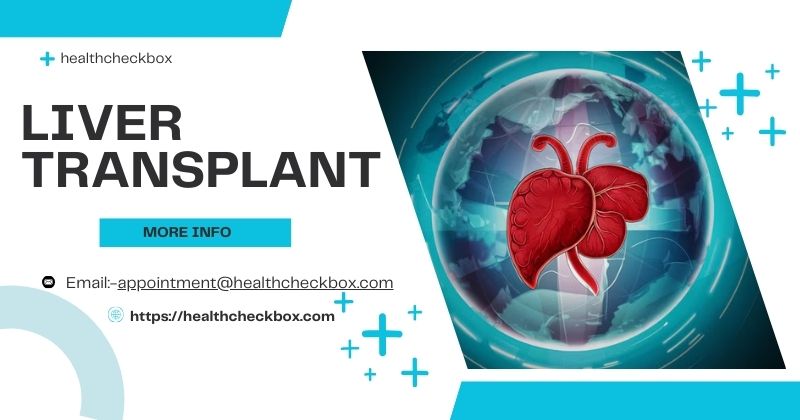Liver transplantation is a surgical procedure that involves the removal of a diseased or damaged liver and its replacement with one from a donor. Usually, this is done after the liver has been drastically compromised by disease or injury. It is also usually attempted when other treatments have failed to address the problem. Liver transplants can significantly improve the quality of life and increase survival for someone with liver failure.
Indications for Liver Transplantation
This is the most common cause of liver transplantation. It develops once the liver experiences heavy scarring due to long-standing damage that makes the liver unable to perform normally.
The main causes are:-
Chronic hepatitis B or C: This is the persistent viral infection that can continue to damage the liver constantly.
Alcoholic liver disease: Damage due to alcoholism.
Non-alcoholic fatty liver disease: Commonly related to obesity, diabetes, and metabolic syndrome.
Autoimmune liver diseases: Illnesses like autoimmune hepatitis, whereby the immune system mistakenly assaults the liver.
Genetic liver diseases: Disorders including hemochromatosis and Wilson’s disease .
Acute Liver Failure:-
Acute liver failure is characterized by a rapid and severe impairment of liver function, which might occur within days or weeks. This condition is a medical emergency and may require instant transplantation. Causes include
Drug-induced liver injury: Especially from an overdose of acetaminophen (paracetamol) or other drugs.
Viral infections: Including hepatitis A, B, and E.
Toxins: This includes specific herbs, mushroom species such as Amanita phalloides or some chemicals from industries.
Acute autoimmune hepatitis: This can be an acute autoimmune attack on the liver.
Hepatocellular Carcinoma:-
Hepatocellular carcinoma, or liver cancer, is one of the main cancers that can necessitate a liver transplant, particularly when it is localized to the liver and meets certain criteria, such as the Milan criteria. Patients with early-stage HCC and cirrhosis can benefit from liver transplantation because it removes both the tumor and the damaged liver tissue, thus reducing the risk of recurrence.
Risks of Liver Transplantation
Some risks associated with liver transplantation include potential complications that can occur both before and after the surgery. While liver transplants are generally seen as lifesaving procedures, they carry certain risks that require careful management.
Rejection of the New Liver:-
Immune System Response: The immune system may recognize the new liver as a foreign object and try to reject it, leading to inflammation and damage to the transplanted organ.
Treatment: To prevent rejection, patients are given immunosuppressive drugs, but these medications can also heighten the risk of other complications.
Infection:-
Risk Factor: The immunosuppressive drugs that help prevent rejection can weaken the immune system, making patients more vulnerable to infections.
Common Infections: These infections can be bacterial, fungal, or viral, including pneumonia, urinary tract infections, and infections at the surgical site.
Bleeding:-
Surgical Risks: As liver transplantation is a major surgical procedure, there is a significant risk of severe bleeding during the operation, which may necessitate blood transfusions.
After Surgery: Patients may also experience ongoing bleeding or clotting issues post-surgery.
Blood Clots:-
Thrombosis: The formation of blood clots in veins can occur, with portal vein thrombosis being a common issue during and shortly after the transplant, potentially leading to further complications, including organ failure.
Organ Failure:-
Liver Function Problem: Occasionally, the transplanted liver may not function properly, either failing to work well initially or experiencing graft failure later on.
Other organs can also be affected; for instance, complications may arise during the process.
Post-Transplant Diabetes :-
New Onset Diabetes: Some individuals may experience the onset of diabetes following liver transplantation, which can be attributed to the side effects of immunosuppressive medications or other complications related to the surgery.
Cardiovascular Problems:-
Heart Problems: Transplant recipients may face cardiovascular issues such as hypertension or heart failure, particularly if they had pre-existing health conditions.
Kidney Dysfunction:-
Kidney Problems: Kidney failure can result from the transplant surgery itself or from certain medications, especially immunosuppressants, which can cause kidney damage over time.
Recovery of Liver Transplantation
Hospital Stay:-
Intensive Care Unit Monitoring: You will be closely monitored in the ICU for a few days immediately after your surgery.
Pain Management: You will be administered pain relief medication to help you cope with any discomfort from the procedure.
Fluid and Nutrition: You will receive fluids through an IV initially and gradually progress to a regular diet.
Monitoring for Complications: The medical team will keep a close eye out for any potential complications, like bleeding, infection, or organ rejection.
Post-Discharge:-
Outpatient Follow-Up: You’ll have regular follow-up visits with your transplant team to check on your recovery and address any concerns.
Medications: You’ll need to take medications for the rest of your life to prevent your body from rejecting the new organ and to manage other health issues.
Lifestyle Adjustments: Some lifestyle changes will be necessary, such as avoiding certain foods and limiting intense physical activities.
Gradual Return to Normal Activities: Over time, you’ll be able to slowly resume your normal activities, including work, exercise, and social events.
Key Considerations:-
Rejection: Your immune system might attempt to reject the transplanted organ, so you’ll need to take medications to suppress it and lower the risk of rejection.
Side Effects of Immunosuppression: The medications that suppress your immune system can lead to side effects, including a higher risk of infections and certain types of cancer.
Long-Term Management: Managing your health after a liver transplant will require lifelong attention, including regular checkups, medication adherence, and maintaining a healthy lifestyle.
Conclusion
A liver transplant is a crucial procedure for patients facing end-stage liver disease or acute liver failure. It offers a chance for improved quality of life and increased survival when other treatments have failed. While the surgery itself tends to be successful, the recovery process relies heavily on effective post-surgical care and ongoing follow-up throughout the patient’s life.
Learn more (Click here)











